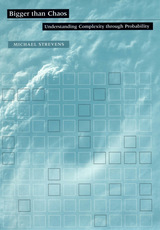
Many complex systems—from immensely complicated ecosystems to minute assemblages of molecules—surprise us with their simple behavior. Consider, for instance, the snowflake, in which a great number of water molecules arrange themselves in patterns with six-way symmetry. How is it that molecules moving seemingly at random become organized according to the simple, six-fold rule? How do the comings, goings, meetings, and eatings of individual animals add up to the simple dynamics of ecosystem populations? More generally, how does complex and seemingly capricious microbehavior generate stable, predictable macrobehavior?
In this book, Michael Strevens aims to explain how simplicity can coexist with, indeed be caused by, the tangled interconnections between a complex system’s many parts. At the center of Strevens’s explanation is the notion of probability and, more particularly, probabilistic independence. By examining the foundations of statistical reasoning about complex systems such as gases, ecosystems, and certain social systems, Strevens provides an understanding of how simplicity emerges from complexity. Along the way, he draws lessons concerning the low-level explanation of high-level phenomena and the basis for introducing probabilistic concepts into physical theory.
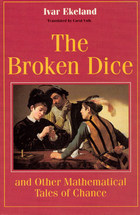
"Ivar Ekeland gained a large and enthusiastic following with Mathematics and the Unexpected, a brilliant and charming exposition of fundamental new discoveries in the theory of dynamical systems. The Broken Dice continues the same theme, and in the same elegant, seemingly effortless style, but focuses more closely on the implications of those discoveries for the rest of human culture. What are chance and probability? How has our thinking about them been changed by the discovery of chaos? What are all of these concepts good for? . . . Ah, but, I mustn't give the game away, any more than I should if I were reviewing a detective novel. And this is just as gripping a tale. . . . Beg, borrow, or preferably buy a copy. . . . I guarantee you won't be disappointed."—Ian Stewart, Science
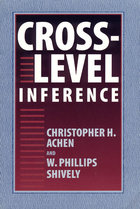
Experts in statistical analysis of aggregate data, Christopher H. Achen and W. Philips Shively contend that cross-level inference makes unusually strong demands on substantive knowledge, so that no one method, such as Goodman's ecological regression, will fit all situations. Criticizing Goodman's model and some recent attempts to replace it, the authors argue for a range of alternate techniques, including estensions of cross-tabular, regression analysis, and unobservable variable estimators.

Epistemology and Inference was first published in 1983. Minnesota Archive Editions uses digital technology to make long-unavailable books once again accessible, and are published unaltered from the original University of Minnesota Press editions.
Henry Kyburg has developed an original and important perspective on probabilistic and statistical inference. Unlike much contemporary writing by philosophers on these topics, Kyburg's work is informed by issues that have arisen in statistical theory and practice as well as issues familiar to professional philosophers. In two major books and many articles, Kyberg has elaborated his technical proposals and explained their ramifications for epistemology, decision-making, and scientific inquiry. In this collection of published and unpublished essays, Kyburg presents his novel ideas and their applications in a manner that makes them accessible to philosophers and provides specialists in probability and induction with a concise exposition of his system.
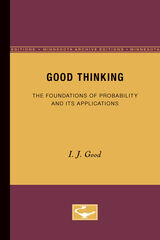
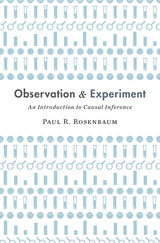
A daily glass of wine prolongs life—yet alcohol can cause life-threatening cancer. Some say raising the minimum wage will decrease inequality while others say it increases unemployment. Scientists once confidently claimed that hormone replacement therapy reduced the risk of heart disease but now they equally confidently claim it raises that risk. What should we make of this endless barrage of conflicting claims?
Observation and Experiment is an introduction to causal inference by one of the field’s leading scholars. An award-winning professor at Wharton, Paul Rosenbaum explains key concepts and methods through lively examples that make abstract principles accessible. He draws his examples from clinical medicine, economics, public health, epidemiology, clinical psychology, and psychiatry to explain how randomized control trials are conceived and designed, how they differ from observational studies, and what techniques are available to mitigate their bias.
“Carefully and precisely written…reflecting superb statistical understanding, all communicated with the skill of a master teacher.”
—Stephen M. Stigler, author of The Seven Pillars of Statistical Wisdom
“An excellent introduction…Well-written and thoughtful…from one of causal inference’s noted experts.”
—Journal of the American Statistical Association
“Rosenbaum is a gifted expositor…an outstanding introduction to the topic for anyone who is interested in understanding the basic ideas and approaches to causal inference.”
—Psychometrika
“A very valuable contribution…Highly recommended.”
—International Statistical Review
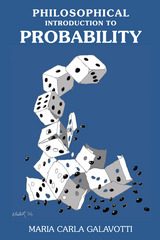
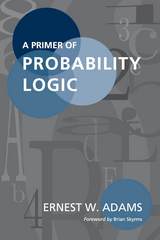
This book is meant to be a primer, that is, an introduction, to probability logic, a subject that appears to be in its infancy. Probability logic is a subject envisioned by Hans Reichenbach and largely created by Adams. It treats conditionals as bearers of conditional probabilities and discusses an appropriate sense of validity for arguments such conditionals, as well as ordinary statements as premisses.
This is a clear well-written text on the subject of probability logic, suitable for advanced undergraduates or graduates, but also of interest to professional philosophers. There are well-thought-out exercises, and a number of advanced topics treated in appendices, while some are brought up in exercises and some are alluded to only in footnotes. By this means, it is hoped that the reader will at least be made aware of most of the important ramifications of the subject and its tie-ins with current research, and will have some indications concerning recent and relevant literature.
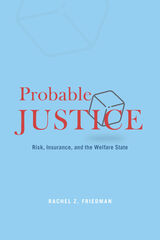
Probable Justice traces a history of social insurance from the eighteenth century to today, from the earliest ideas of social accountability through the advanced welfare state of collective responsibility and risk. At the heart of Rachel Z. Friedman’s investigation is a study of how probability theory allows social insurance systems to flexibly measure risk and distribute coverage. The political genius of social insurance, Friedman shows, is that it allows for various accommodations of needs, risks, financing, and political aims—and thereby promotes security and fairness for citizens of liberal democracies.
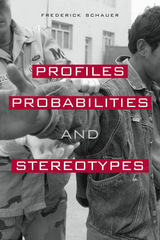
This book employs a careful, rigorous, yet lively approach to the timely question of whether we can justly generalize about members of a group on the basis of statistical tendencies of that group. For instance, should a military academy exclude women because, on average, women are more sensitive to hazing than men? Should airlines force all pilots to retire at age sixty, even though most pilots at that age have excellent vision? Can all pit bulls be banned because of the aggressive characteristics of the breed? And, most controversially, should government and law enforcement use racial and ethnic profiling as a tool to fight crime and terrorism?
Frederick Schauer strives to analyze and resolve these prickly questions. When the law “thinks like an actuary”—makes decisions about groups based on averages—the public benefit can be enormous. On the other hand, profiling and stereotyping may lead to injustice. And many stereotypes are self-fulfilling, while others are simply spurious. How, then, can we decide which stereotypes are accurate, which are distortions, which can be applied fairly, and which will result in unfair stigmatization?
These decisions must rely not only on statistical and empirical accuracy, but also on morality. Even statistically sound generalizations may sometimes have to yield to the demands of justice. But broad judgments are not always or even usually immoral, and we should not always dismiss them because of an instinctive aversion to stereotypes. As Schauer argues, there is good profiling and bad profiling. If we can effectively determine which is which, we stand to gain, not lose, a measure of justice.
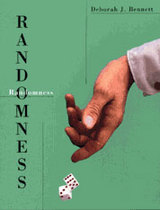
From the ancients’ first readings of the innards of birds to your neighbor’s last bout with the state lottery, humankind has put itself into the hands of chance. Today life itself may be at stake when probability comes into play—in the chance of a false negative in a medical test, in the reliability of DNA findings as legal evidence, or in the likelihood of passing on a deadly congenital disease—yet as few people as ever understand the odds. This book is aimed at the trouble with trying to learn about probability. A story of the misconceptions and difficulties civilization overcame in progressing toward probabilistic thinking, Randomness is also a skillful account of what makes the science of probability so daunting in our own day.
To acquire a (correct) intuition of chance is not easy to begin with, and moving from an intuitive sense to a formal notion of probability presents further problems. Author Deborah Bennett traces the path this process takes in an individual trying to come to grips with concepts of uncertainty and fairness, and also charts the parallel path by which societies have developed ideas about chance. Why, from ancient to modern times, have people resorted to chance in making decisions? Is a decision made by random choice “fair”? What role has gambling played in our understanding of chance? Why do some individuals and societies refuse to accept randomness at all? If understanding randomness is so important to probabilistic thinking, why do the experts disagree about what it really is? And why are our intuitions about chance almost always dead wrong?
Anyone who has puzzled over a probability conundrum is struck by the paradoxes and counterintuitive results that occur at a relatively simple level. Why this should be, and how it has been the case through the ages, for bumblers and brilliant mathematicians alike, is the entertaining and enlightening lesson of Randomness.

The first examination of predictive technology from the perspective of Catholic theology
Probabilistic predictions of future risk govern much of society. In business and politics alike, institutional structures manage risk by controlling the behavior of consumers and citizens. New technologies comb through past data to predict and shape future action. Choosing between possible future paths can cause anxiety as every decision becomes a calculation to achieve the most optimal outcome.
Tomorrow’s Troubles is the first book to use virtue ethics to analyze these pressing issues. Paul Scherz uses a theological analysis of risk and practical reason to show how risk-based decision theory reorients our relationships to the future through knowledge of possible dangers and foregone opportunities—and fosters a deceptive hope for total security. Scherz presents this view of temporality as problematic because it encourages a desire for stability through one’s own efforts instead of reliance on God. He also argues that the largest problem with predictive models is that they do not address individual reason and free will. Instead of dwelling on a future, we cannot control, we can use our past experiences and the Christian tradition to focus on discerning God’s will in the present.
Tomorrow’s Troubles offers a thoughtful new framework that will help Christians benefit from the positive aspects of predictive technologies while recognizing God’s role in our lives and our futures.
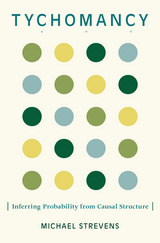
Tychomancy—meaning “the divination of chances”—presents a set of rules for inferring the physical probabilities of outcomes from the causal or dynamic properties of the systems that produce them. Probabilities revealed by the rules are wide-ranging: they include the probability of getting a 5 on a die roll, the probability distributions found in statistical physics, and the probabilities that underlie many prima facie judgments about fitness in evolutionary biology.
Michael Strevens makes three claims about the rules. First, they are reliable. Second, they are known, though not fully consciously, to all human beings: they constitute a key part of the physical intuition that allows us to navigate around the world safely in the absence of formal scientific knowledge. Third, they have played a crucial but unrecognized role in several major scientific innovations.
A large part of Tychomancy is devoted to this historical role for probability inference rules. Strevens first analyzes James Clerk Maxwell’s extraordinary, apparently a priori, deduction of the molecular velocity distribution in gases, which launched statistical physics. Maxwell did not derive his distribution from logic alone, Strevens proposes, but rather from probabilistic knowledge common to all human beings, even infants as young as six months old. Strevens then turns to Darwin’s theory of natural selection, the statistics of measurement, and the creation of models of complex systems, contending in each case that these elements of science could not have emerged when or how they did without the ability to “eyeball” the values of physical probabilities.
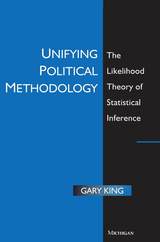
"Gary King's Unifying Political Methodology is at once an introduction to the likelihood theory of statistical inference and an evangelist's call for us to change our ways of doing political methodology. One need not accept the altar call to benefit enormously from the book, but the intellectual debate over the call for reformation is likely to be the enduring contribution of the work."
--Charles Franklin, American Political Science Review
"King's book is one of the only existing books which deal with political methodology in a clear and consistent framework. The material in it is now and will continue to be essential reading for all serious students and researchers in political methodology." --R. Michael Alvarez, California Institute of Tech-nology
Gary King is Professor of Government, Harvard University. One of the leading thinkers in political methodology, he is the author of A Solution to the Ecological Inference Problem: Reconstructing Individual Behavior from Aggregate Data and other books and articles.
READERS
Browse our collection.
PUBLISHERS
See BiblioVault's publisher services.
STUDENT SERVICES
Files for college accessibility offices.
UChicago Accessibility Resources
home | accessibility | search | about | contact us
BiblioVault ® 2001 - 2024
The University of Chicago Press









